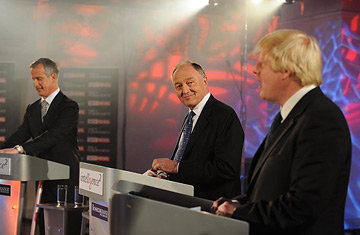
London Mayoral candidates, Brian Paddick (left), Ken Livingstone (center) and Boris Johnson take part in the Sky News Mayoral Debate at Cadogan Hall in London.
If nobody is laughing, then it's probably not a British election. Since the launch a quarter of a century ago of the Official Monster Raving Loony Party, contenders sporting ridiculous names and deliberately nonsensical manifestos have taken part in many of the country's parliamentary, municipal and mayoral polls, and sometimes even won them. In the 2002 mayoral race in the port city of Hartlepool, for instance, a man dressed as a monkey and promising free bananas decisively beat Labour and Britain's two other leading parties, the Conservatives and the Liberal Democrats. So it's not surprising that Ken Livingstone, the Labour politician aiming to win a third consecutive four-year term as London's mayor, hopes humor will help him to defeat his main challenger, Conservative Boris Johnson, when Britain's capital goes to the polls on May 1.
There's a twist. Livingstone, who is known for a sharp turn of phrase and once quipped that "if voting changed anything, they'd abolish it," is trying to scare Londoners off voting for Johnson by suggesting that the Conservative is the funnier man, perhaps even the ultimate joke candidate. Billboard posters and 4.2 million postcards being distributed by Livingstone's campaign urge voters to imagine Johnson, despite more than six years as a member of parliament still best known for his many comically chaotic appearances on British TV game shows, in charge of London. "Suddenly he's not so funny," warns Livingstone's campaign literature.
Johnson, wild-haired and often wild-eyed on the stump, hasn't helped his cause by contradicting his own policy statements. For example, he has quoted an array of widely different costs for his plan to deploy eco-friendly versions of London's iconic double-decker buses. Such fumbles are a gift to Livingstone, whose success or failure will resonate loudly in Westminster. Voters throughout England and Wales are casting ballots in municipal elections on the same day, and Gordon Brown's battered Labour government is expected to perform miserably, losing perhaps as many as 200 local council seats. A Labour defeat in London's mayoral election would raise loud chortles in Conservative ranks and strengthen his critics in the media and his own party.
Yet if Livingstone loses, it won't simply be due to his association with an unpopular national government. Some of Livingstone's own antics in office have also provoked mirth — and anger. He won international praise for his pioneering congestion charging scheme that levies a toll on motorists entering central London. His calm response to the July 2005 terror attacks on the capital and his leadership in securing the 2012 Olympic Games for the city have also enhanced his reputation. But he's been damaged by the departure of two aides amid allegations of cronyism at City Hall, and he has been mocked for giving red-carpet treatment to controversial figures such as the radical Islamic cleric Yusuf al-Qaradawi and Venezuelan President Hugo Chavez, who last year repaid the compliment by signing a deal to provide London's buses with cheap Venezuelan fuel.
Londoners will very soon decide which mayoral candidate enjoys the last laugh. The voting process, which allows voters to indicate their first and second preferences, adds to the unpredictability of the result. If no candidate wins more than 50% of the votes outright, then all but the top two candidates are eliminated and any second-preference votes for the leaders are added to their tallies. The Green Party is encouraging its supporters to give their second vote to Livingstone; some fans of the Liberal Democrat candidate Brian Paddick, once the highest-ranking openly gay officer in London's Metropolitan police, may opt to allocate their second vote to Johnson. A clever Conservative ploy to mobilize voters in London's outer, more suburban boroughs, who have tended not to vote in mayoral elections, could also pay dividends to Johnson.
As the campaign enters its final days, opinion polls are split, with some showing Livingstone in the lead and others suggesting that Johnson will prevail. After eight years of Livingstone's city administration, one of Johnson's advantages is his pledge to serve a maximum of two terms if elected, and to improve accountability at City Hall. The mayor exercises considerable strategic powers over policing and emergency services, transport, planning and regeneration in the capital. In theory, he is held to account by the 25 elected members of the London Assembly, but in practice, assembly members can do little more than question the mayor and vote to amend the budgets he puts forward.
Any enthusiasm for addressing this democratic deficit could be diminished if the May 1 elections see the British National Party pick up its first-ever Assembly seats. Promising to "stop immigration", to give "British jobs to British workers" and to "House British people first," the party is hoping its crude populist message will resonate with white Londoners. Some pollsters predict they'll win one or two seats. It's a timely reminder that politics isn't always a laughing matter.
